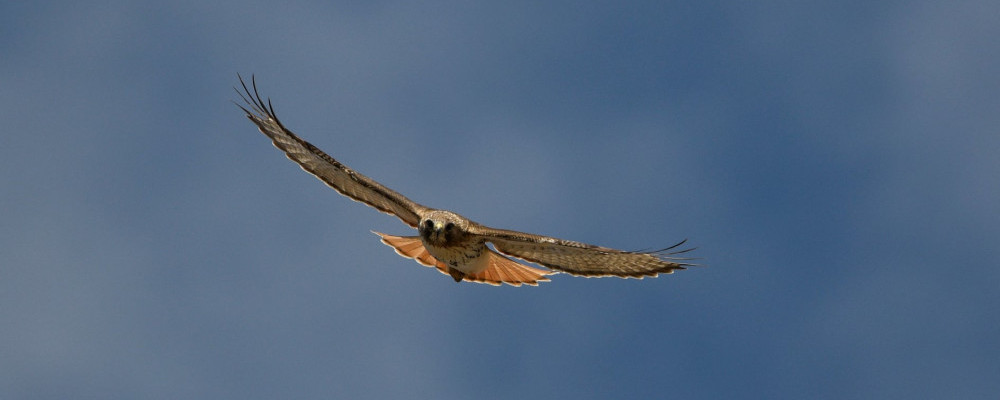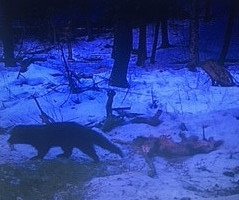One late afternoon several years ago, I arrived at home to find that there had been a massacre of my flock. There were chickens everywhere – on the lawn, in the weeds, over the embankment. It was brutal.
Many foxes live in my area, and when they have kits, they become killing machines. One lucky lady fox found my chickens out free-ranging and did her worst.
Chickens are on the menu of many predators. Will raccoons kill chickens? Yes. Opossums? Yes. Hawks? Yes.
Let’s look at some of these predators and see what we can do about them.
What is a Chicken’s Biggest Predator?

The number one killer of chickens is probably dogs during the daytime. My big Bully, Chip, accidentally killed three of my pullets while trying to play with them.
I didn’t realize what was happening until I saw him nudging a carcass, trying to get it to keep playing. One good scolding is all it took to get him never to do it again. Stray dogs can also be a problem.
Strays aren’t a problem where I live, but bobcats, coyotes, and various raptors are.
Other daytime predators include, but are not limited to:
- Hawks and Eagles
- Foxes, while raising kits
- Domestic cats
- Mink and Weasels
- Snakes
- Bears
Nighttime predators:
- Fox, Coyotes
- Raccoon
- Mink, Weasels, Opossums
- Fishers
- Skunks
- Bears
- Owls at dusk
How Do I Know If A Predator Killed My Chickens?
When the fox attacked my chickens, she left feathers where the initial grab occurred. It was easy to discern where each kill occurred by an area of feathers about 3-4 feet in diameter.
There were also dead chickens left behind. She killed about ten chickens in all. I have read that foxes kill only one chicken per visit and don’t return until they need another, but my experience has been otherwise.
Sometimes, you don’t witness an attack and aren’t missing any chickens, but laying drops off for a week or so. This could have been an unsuccessful yet frightening and stressful stealth attack.
Birds of prey will kill a chicken with their powerful talons and, if undisturbed, consume it on the spot. If it is so inclined, it will fly off with the chicken.
Generally, this affects only free-range chickens unless your run is open on top. Chickens that survive a bird of prey attack will most likely have missing feathers and puncture wounds. It is hard to find signs of an eagle attack since they grab and go, leaving little to no sign. An owl might swoop in around dusk, but this is rare.

Mink and Weasels look similar to the untrained eye but kill chickens for different reasons. A mink kills for the blood it can drink. Drinking blood sounds pretty gruesome, but there is no more easily assimilable food on the planet.
It comes with all the nutrients a critter needs in one tasty cocktail. All mink require to get into a coop is a one-inch hole, so button up your coops if you want to keep your chickens.
Weasels are curious, opportunistic creatures that will kill chickens in a coop, eat eggs on the spot, pull entrails from their kills, and take more birds than they need. If heads are missing from your chickens, you could have had a weasel attack.
Canines will kill chickens. Dogs do so by accident, either by chasing, crushing them during play, or giving the birds a heart attack. A dog would only eat a chicken because it is starving. All the other canines—wolves, coyotes, and foxes—will take and eat chickens. Generally, some feathers will be left behind as canines kill in a rough manner.
Felines, like bobcats and mountain lions, will grab and go similarly to canines. It’s hard to tell the difference between a large cat attack and a large canine attack. A few feathers are usually left behind.
Bobcats will kill many birds in one attack, and your entire flock will be destroyed if the cat can find them. House cats probably won’t bother an adult chicken unless they’re starving, but they will gobble up chicks if given the opportunity.
Opossums will eat eggs and chicks and will kill an adult chicken. They attack the neck and breast area, leaving bite marks as a telltale sign of their presence. They tend to eat where they kill, so there will be bodies, feathers, tracks, and possibly droppings that look like small dog poo – cylindrical and an inch or two long.
Raccoons kill and tear chickens into pieces. You can’t get too upset about that since we humans do the same thing. The difference is that a raccoon will rip off the chicken’s head and leave parts scattered around. They will also eat the crop, breast, and internal organs. Other signs of a raccoon attack are that they may make a mess of your garbage can and bird feeder.
Snakes will eat eggs and chicks. Generally, they are not a threat to adult birds. Of course, snakes can eat chickens, but that is not much of a concern in the northern U.S.
Bears will eat chickens, chicks, eggs, feed, garbage, and anything else they find edible. A sign that a bear has attacked your flock is the destruction of everything blocking its way to achieving its goal. Bears mostly forage during the day, so night visits are rare.

Fishers are determined killers that will work to get into your coop. They can dig, chew, and climb. Fishers eat the head, neck, and breast.
Look for the indications mentioned when determining what predator went after your birds. Other things to look for are tracks – familiarize yourself with the predator tracks in your area. Droppings are another indicator to look for.
How Do I Keep My Chickens Safe?
Not all areas have all the predators listed above. If your location does, you want to utilize an all-encompassing program to keep your chickens safe.
Starting with the worst of the bunch, keeping a bear from getting to your chickens will require an electric fence surrounding your chicken coop. Electric poultry fencing is simple to set up and an excellent barrier to keep ground predators from getting to your flock—a decent 150-foot fence costs around $200.00-$300.00.
Putting netting over your chicken run area for aerial attacks would be best – the heavier, the better.
If a weasel gets past your electric fence, you will want to ensure no holes in your coop are large enough for it to sneak through. All vent holes must be covered with a heavy hardware cloth or similar screening.
To keep critters from digging under fences, hardware cloth or heavy fencing should be buried about a foot down around the perimeter of your fence.
What Steps Can I Take When A Predator Attacks?
After a predator attack, there are several steps you must take to address the problem.
First, you must assess the damage and help chickens that are not mortally wounded. Next, you must fix the issue that allowed the attack—plug holes in the coop, apply netting, buy electric fencing, etc. Finally, it would be best if you dealt with the predator.
Many species of animals are either protected or have seasons, restrictions, or prohibitions on their killing, trapping, or harassing in any way, so upon identifying your offending animal, be sure to check with wildlife management in your area to find out how best to proceed.
Once they have responded, you can take care of your predator using legal means. That may mean getting an outside agency involved in a relocation plan.
To care for your injured chickens, move them to a safe location to treat them in isolation.
Try to stop any bleeding and clean with an antiseptic or wound care treatment from any farm store. Try to get into deeper wounds with a syringe.
The chance of infection must be mitigated as much as possible. Give the injured birds plenty of food and water. Mixing five aspirin tablets in a gallon of water can help ease any pain.
Use a wound spray (follow the directions on the container) to keep the wounds clean and germ-free until the chicken is back in shape. Return the birds to the flock only when they are in perfect health.
Wrapping it Up
Chickens have many predators, which attack at night and during the day. Keeping your chickens safe is challenging but not impossible. Learn the signs that predators are around and take steps to keep them at bay. If the worst happens, know how to save as many chickens as possible.
Thanks a lot for reading. I’d love to hear what you think about what I’ve written. If you have any questions or just want to add to what I’ve said, please leave a comment below. I’ll get back to you in less than 24 hours. Take care.
Dave

Chickenmethod.com


Thank you for sharing your personal experience and insights about the different predators that can attack and kill chickens. It is helpful to know the signs of each predator’s attack, such as the area of feathers left by a fox and the missing heads from a weasel attack. Additionally, it is important to understand how to prevent predators from entering the coop or run, such as by closing off any one-inch holes to keep mink out or securing the garbage can and bird feeder to deter raccoons.
You’re welcome Anoth. It’s important to know what to do to protect your investments, however small. The best way to protect your chickens is to build or buy a solid chicken coop and run. Safe chickens are happy chickens! And forewarned is forearmed.
Stay well, Anoth